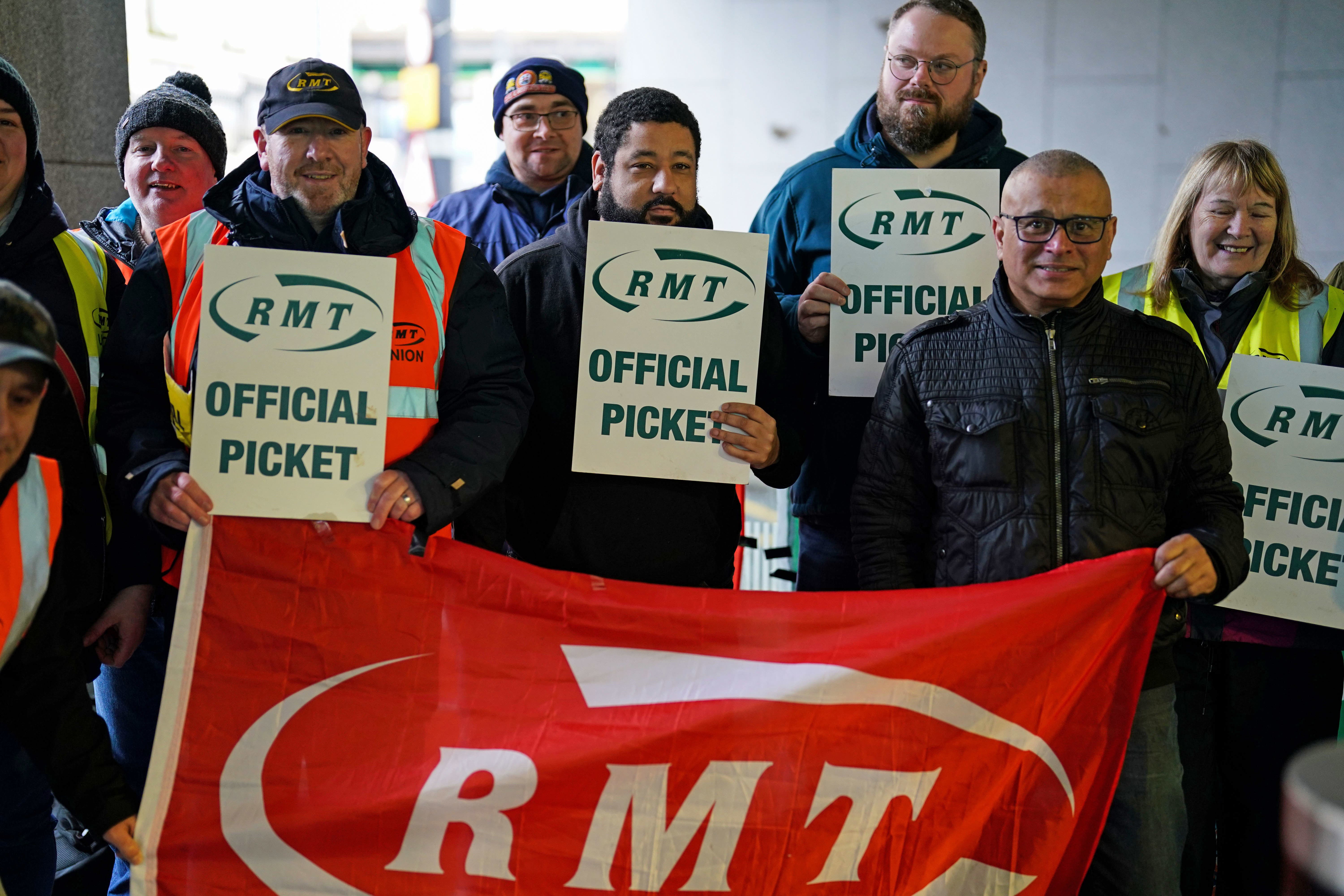Train companies make ‘best and final offer’ to resolve rail dispute
The offer includes a minimum pay rise of 9% over two years and guaranteed no compulsory redundancies until at least the end of December 2024.

Train operating companies have made a “best and final offer” to the biggest rail workers union in a bid to break the deadlocked dispute over pay, jobs and conditions.
The Rail Delivery Group (RDG) said the offer to the Rail, Maritime and Transport union (RMT) included a minimum pay rise of 9% over two years and guaranteed no compulsory redundancies until at least the end of December 2024, which is an improvement to the previous offer of April 1 2024.
A statement said: “The offer, made through an outline framework agreement, would allow the industry to adapt to significant changes in the ways in which passengers use the railway, while offering rewarding and varied careers for staff.
“If accepted, it would help recover the industry’s finances post-covid, reducing the burden on taxpayers at a time of significant pressure on public spending.”
RMT general secretary Mick Lynch said the union’s executive will consider the offer and decide its next steps “in due course”.
Under the offer, staff who are paid below a certain threshold will receive a guaranteed £1,750 in year one, ensuring that lower paid employees benefit most.
Pay would be backdated to the relevant 2022 pay award date with employers, enabling staff to benefit from a lump sum payment in the first available pay run.
The RDG said many of its proposals “simply extend” best practice already in place in parts of the network, including the creation of a new multi-skilled station role, new “station groups” so that staff are more able to move between stations to help passengers, for example where there are staff shortages, and the use of part-time contracts and flexible working rosters.
Current voluntary working arrangements on Sundays would be formalised, which the RDG said would help to reduce delays and disruption for passengers during weekend travel at a time when Sunday travel demand has increased significantly post-Covid.
A voluntary redundancy scheme will be made available for those who wish to leave the industry.
The contentious issue of expanding driver-only operation is not included in the new offer.
The RDG said: “The offer does not include any proposals to revise the mode of operation of trains but acknowledges that individual, train operating companies could separately make proposals to update and revise current on‐board roles – for example, reflecting the use of new, on-board technology for station/driver dispatch processes.”
The RDG said industrial action has cost the industry about £480 million in lost ticket revenue since June, on top of its current £2 billion fares shortfall post-Covid.
Steve Montgomery, chair of the Rail Delivery Group, said: “This is a fair offer that gives RMT members a significant uplift over the next two years – weighted particularly for those on lower incomes who we know are most feeling the squeeze – while allowing the railway to innovate and adapt to new travel patterns. It also means we can offer our people more varied, rewarding careers.
“With taxpayers still funding up to an extra £175 million a month to make up the shortfall in revenue post-Covid, we urge the RMT to put this offer to its members so we can bring an end to this damaging dispute for our people, our passengers and the long-term future of Britain’s railways.”
The RMT said its national executive will now consider details in the offer and what next steps to take.
A statement said: “The proposals include detailed documentation covering a range of issues that affect all of our grade groups at these 14 companies and will require serious and careful consideration.
“The proposals on pay and job security are directly conditional on cost savings and alterations to contractual terms, entitlements, and working practices.”
We are not going to sell out one group of workers for another group of workers
RMT general secretary Mick Lynch said: “The National Executive Committee will be considering this matter and has made no decision on the proposals nor any of the elements within them.
“We will give an update on our next steps in due course.”
Meanwhile the Rail Delivery Group also held a meeting with the Transport Salaried Staffs’ Association (TSSA), whose members have also taken strike action over pay, jobs and conditions.
But TSSA organising director Luke Chester said no “final offer” that “covers all members” was made to the union.
Speaking outside the First Group offices in Paddington, west London, he told the PA news agency: “Talks progressed today around a range of issues as we know in the dispute from pay, job security, changes within the industry and terms and conditions of employment.
“We haven’t received a final offer from the company which covers all of our members involved in the dispute.”
Mr Chester added: “We understand that an offer has been made to another union for a certain section of the grades. We’ve had sight of that offer but, as I’ve said, we need an offer that reflects the demands of the dispute for all our members concerned.
“We are not going to sell out one group of workers for another group of workers.”
Subscribe to Independent Premium to bookmark this article
Want to bookmark your favourite articles and stories to read or reference later? Start your Independent Premium subscription today.
